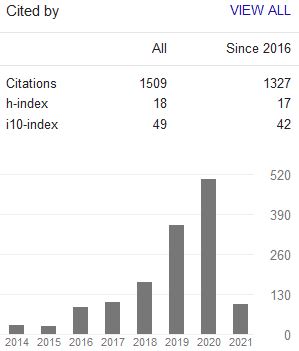A MODEL OF ISLAMIC TEACHER EDUCATION FOR SOCIAL JUSTICE IN INDONESIA: A Critical Pedagogy Perspective
Abstract
Keywords
Full Text:
PDFReferences
Al-Attas, Syed Muhammad Naguib, (ed). Aims and Objectives of Islamic Education. Jeddah: King Abdulaziz University, 1979.
Banks, James A. (ed). The Routledge International Companion to Multicultural Education. New York and London: Routledge Taylor & Francis Group, 2011.
----------. “Multicultural Education: Characteristics and Goals.” James A Banks and Cherry A McGee Banks (eds). Multicultural Education: Issues and Perspectives. New Jersey: Wiley, 2010. pp. 5-10.
Bartoleme, Lilia I. “Critical Pedagogy and Teacher Education: Radicalizing Prospective Teachers.” Teacher Education Quarterly Winter (2004).
Berns, Robert G, and Patricia M Erickson. “Contextual Teaching and Learning: Preparing Students for the New Economy.” The Highlight Zone: Research & Work, 5 (2001), pp. 2-9.
Blunt, Peter, Mark Turner, and Henrik Lindroth. “Patronage, Service Delivery, and Social Justice in Indonesia.” International Journal of Public Administration, 35, 3 (2012), pp. 214-220.
Bourdieu, Pierre. “The Forms of Capital.” J. Richardson. Handbook of Theory and Research for the Sociology of Education. New York: Greenwood, 1986. pp. 47-51.
----------. and Jean-Claude Passeron. Reproduction in Education, Society and Culture. London: Sage, 1990.
DeJaeghere, Joan G. “Critical Citizenship Education for Multicultural Societies.” Interamerican Journal of Education for Democracy, 2, 2 (2009), pp. 204-210.
Esposito, John L. Islam the Straight Path. New York and Oxford: Oxford University Press, 1998.
Fealy, Greg. A Conservative Turn. Available at www.insideindonesia.org/ a-conservative-turn.
Freire, Paulo. Pedagogy of the Oppressed. New York and London: Continuum, 1970.
Gewirtz, Sharon. “Rethinking Social Justice: A Conceptual Analysis”. J. Demaine (ed.). Sociology of Education Today. Basingstoke: Palgrave, 2001. pp. 49-64.
Giddens, Anthony, Mitchell Duneier, Richard P. Appelbaum and Deborah Carr. Introduction to Sociology. New York: W. W. Norton & Company, Inc., 2012.
Giroux, Henry and Anthony N. Penna. “Social Education in the Classroom: The Dynamics of the Hidden Curriculum.” Theory and Research in Social Education, 7, 1 (1979), pp. 21-24.
Hartanto, Naomi Jesica, Meta Nadia and Lusi Septiani. “The Realization of Social Justice for Underprivileged People in Legal Philosophy.” Legal Spirit, 2, 2 (2018).
Hasbullah. Sejarah Pendidikan Islam di Indonesia; History of Islamic Education in Indonesia. Jakarta: Rajawali Press, 1995.
Hein, George E. “Constructivist Learning Theory.” The Museum and The Needs of People. Jerussalem: CECA Conference, 1991.
Hoon, Chang Yau. Chinese Identity in Post-Suharto Indonesia: Culture, Politics and Media. Brighton: Sussex Academic Press, 2008.
Makdisi, George. The Rise of Colleges: Institutions of Learning in Islam and the West. Edinburgh: Edinburgh University Press, 1981.
McKernan, J. A. “The Origins of Critical Theory in Education: Fabian Socialism as Social Reconstructionism in Nineteenth-Century Britain.” British Journal of Educational Studies, 61, 4 (2013), pp. 417-433.
Muhammad Tajuddin Al-Hilali and Muhammad Muhsin Khan. Interpretation of the Meanings of the Noble Qur'a>n in the English Language. Riyadh: Maktabah Dar-us Salam, (1994)
Parker, Lyn, and Chang Yau Hoon. “Secularity, Religion and the Possibilities for Religious Citizenship.” Asian Journal of Social Science, 41, 2 (2013), pp. 150-174.
Peterson, Daniel. Islam, Blasphemy, and Human Rights in Indonesia; The Trial of Ahok. New York: Taylor & Francis Group, 2020.
Power, Sally and Sharon Gewirtz. “Reading Education Action Zones.” Journal of Education Policy, 16, 1 (2001), pp. 39-51.
Raihani. “Education for Multicultural Citizens in Indonesia: Policies and Practices.” Compare: A Journal of Comparative and International Education, 48, 6 (2018), pp. 992-1009.
----------. “Minority Right to Attend Religious Education in Indonesia.” Al-Jami'ah: Journal of Islamic Studies, 53, 1 (2015), pp. 1-26.
----------. “Teacher Education and Multiculturalism in a State Islamic University in Indonesia: A Preliminary Analysis of Its Curriculum and Instruction of Multicultural Education.” Z. Seyma Altin (ed.). Yüksek Din Öğretimi. Istanbul: Center for Values Education, 2018. pp. 685-700.
----------. Creating Multicultural Citizens: A Portrayal of Contemporary Indonesian Education. New York: Routledge, 2014.
Shokouhi, Mehdi and Farnaz Pashaie. “Critical Pedagogy and Its Realization in Classroom Context.” Journal of Applied Linguistics and Language Research, 2, 3 (2015), pp. 204-210.
Smith, Claire Q. The Roots of Violence and Prospects for Reconciliation: A Case Study of Ethnic Conflict in Central Kalimantan, Indonesia. Washington, DC: The World Bank, 2005.
Sukiman. “Perkembangan Kurikulum Jurusan Pendidikan Agama Islam (PAI) Fakultas Tarbiyah UIN Sunan Kalijaga Yogyakarta Periode 1980-2005.” Jurnal Pendidikan Agama Islam, 4, 2 (2009), pp. 99-119.
The World Bank. Indonesia’s Rising Divide. Jakarta: The World Bank, 2016.
van Bruinessen, Martin (ed.). Contemporary Developments in Indonesian Islam: Explaining The “Conservative Turn”. Singapore: Institute of Southeast Asian Studies, 2013.
Wilson, Chris. Ethno-Religious Violence in Indonesia: From Soil to God. London: Routledge Taylor & Francis Group, 2008.
Young, Iris Marion. Justice and the Politics of Difference. Princeton, NJ: Princeton University Press, 1990.
Yunus, Mahmud. Sejarah Pendidikan Islam di Indonesia. Jakarta: Mutiara, 1979.
DOI: 10.15642/JIIS.2020.14.1.163-186
Refbacks
- There are currently no refbacks.
Indexed by:
Journal of Indonesian Islam (ISSN 1978-6301 and E-ISSN 2355-6994) is published by the Postgraduate Program (PPs) and the Institute for the Study of Religion and Society (LSAS), State Islamic University (UIN) of Sunan Ampel Surabaya.
Journal of Indonesian Islam by http://jiis.uinsby.ac.id/index.php/JIIs/index is licensed under a Creative Commons Attribution-ShareAlike 4.0 International License.
Copyright ©2020 State Islamic University (UIN) of Sunan Ampel Surabaya. Powered by Public Knowledge Project OJS.







